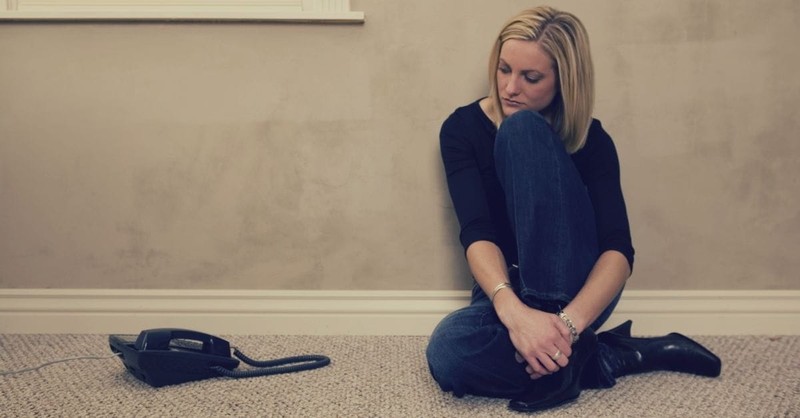
A few months ago, a reader emailed me a message that’s haunted me ever since.
Her husband had been unfaithful several times and, from what I could tell from a short message, showed no sign of repentance.
She struggled with trust issues, she said, and asked if I would pray God would help her trust her husband more.
It’s not the first time readers in toxic relationships have written me with similar requests: how do I let go of anxiety about the boss who constantly screams at me? My husband is emotionally abusive, how do I love him better?
These emails follow roughly the same formula: someone keeps hurting me terribly. How do I accept this?
My short answer is: Don’t.
Don’t accept abusive treatment. Don’t work harder to be ‘good’ in an unbearable situation.
And especially: If a situation is dangerous and toxic, don’t pray for more trust.
Pray for wholeness—real, active wholeness--instead.
Image Credit: Thinkstock.com

I grieve these prayers because for years I prayed them.
When someone I loved threatened suicide when I spoke honestly, I prayed for peace in our relationship—without ever admitting how their threat terrified me. When someone else treated me with contempt, I prayed I’d please them—rather than holding them accountable for emotional abuse.
“Help me find peace,” I kept praying. “Help me do better, Lord.”
I assumed my job was to accept any situation as-is.
But God does not design us to accept toxic situations. He does not call us to trust untrustworthy people. The prophets rail against abusers who say “peace, peace where there is no peace.”
Yes, we’re called to trust God in all situations. But there’s a vast difference between excusing people who harm us and advocating vigorously for wholeness.
I once tried to pray abuse away. Instead, I wish I had learned to lovingly hold people responsible. Peace was definitely available—but it took my active participation to find it.
I once prayed the wrong prayers. Here’s what I wish I’d prayed instead.
Image Credit: Thinkstock.com

Lord, strengthen me enough to get help.
I still remember deciding not to get therapy. I’d just found out some truly disturbing information about my family of origin—information that would ultimately reshape my relationship with my parents, my siblings, and my entire extended family.
Not long after my discovery, I was doing chores alone in my house. As I ran a cloth over our TV, I paused.
Do I need therapy? I wondered.
I knew finding and working with a therapist would be exhausting, time-consuming, and expensive. So, after a moment, I shrugged.
I’ll manage, I thought. I always do.
I limped along for four years before I finally gave in and called a therapist. I dearly wish I had done so sooner.
The very familiarity of my relationships made it almost impossible to recognize when they were unhealthy. My therapist helped me recognize poisonous dynamics, then change them.
I thought ‘strength’ meant ‘going it alone’, but Biblically, seeking counsel is an age-old practice. Barak sought out Deborah, David had Samuel. Especially in abusive situations, we need help to see straight.
I once thought ‘managing’ on my own was laudable. Now, I see the God-given humility, bravery, and strength it takes to seek wise counsel.
Image Credit: Thinkstock.com

Father, help me ask for what I need.
One of the most terrifying things my therapist helped me do was admit to myself what I needed in my relationships, and then say that out loud to other people.
I had thought I asked for what I needed before. But it turned out I used passive-aggressive telepathy instead. If someone made a cutting comment, I sighed loudly. When I felt anxious, I kept my worries to myself instead of discussing solutions.
And when my feelings overwhelmed me, I spewed out anger.
I thought the “peace” Jesus promised us looked a lack of conflict. Instead, true peace involved me naming problems when they arose, and expecting the other person to dialogue with me until we found a solution that worked for both of us.
Naming my needs out loud felt really vulnerable—I had to face the reality that the person could (and sometimes did) say no. I had to accept that relationships might change for the worse.
But living with constant resentment and anxiety takes a toll. The negative relationship changes I feared were much less toxic than the bitterness I’d grown used to.
In addition, naming my needs cleared pathways for real healing.
Image Credit: Thinkstock.com

Lord, help me speak truth in love.
Unsurprisingly, the people I loved weren’t always willing or able to meet my needs—or, sometimes, even discuss them.
Instead of praying for God to help me maintain the status quo, I instead asked Him for enough love, honesty, and courage to establish firm boundaries and protect my heart from those who did not know how to love me well.
Here’s what creating healthy boundaries looked like for me:
I worked with my therapist to figure out what I wanted and could expect from troubled relationships.
I named situations that caused anxiety, rage, bitterness, and shame.
I planned how to avoid those situations or leave them if they developed.
I considered how to do so with the least harm to everyone involved.
I took care not to punish anyone (say, with angry words, meanness, or by arbitrary limits).
I communicated my boundaries to loved ones clearly and without rancor.
I followed through—leaving toxic interactions immediately.
I held boundaries lightly, willing to revisit them if our circumstances changed.
Implementing firm but loving boundaries has transformed all of my relationships—even the ones that weren’t unhealthy before. I’m still in relationship with everyone who once hurt me, and in some cases, boundaries actually strengthened and deepened our bond.
Even when intimacy suffered, though, boundaries helped me preserve what relationship I could without sacrificing my own well-being.
Image Credit: Thinkstock.com

Let’s Pray to Be Fully Alive in Christ
St. Irenaeus of Lyons said, “The glory of God is the human person fully alive.” When I think of Christ, our model for what full life looks like, I see someone loving others with active, truthful words. He did not shrink under oppression or pretend it was not happening. He did not blame his persecutors—but neither did he shame himself for his fate.
True: he willingly shouldered a cross. Yet he did so while affirming his innocence and wholeness and speaking truth aloud.
What would it look like to pray prayers that we would be fully alive, free from shame? How can we be Christ-like within our relationships, firmly setting our gaze towards wholeness?
Let us pray prayers that help us flourish, my friends. Let us ask Jesus for the abundant life he promises—not just passively, but with vigorous, honest, concrete love.
Image Credit: Thinkstock.com
------
Heather Caliri is a writer from San Diego who uses tiny, joyful yeses to free herself from anxiety. Tired of anxiety controlling your life? Try her mini-course, “Five Tiny Ideas for Managing Anxiety," for free here.
Originally published Friday, 20 October 2017.








